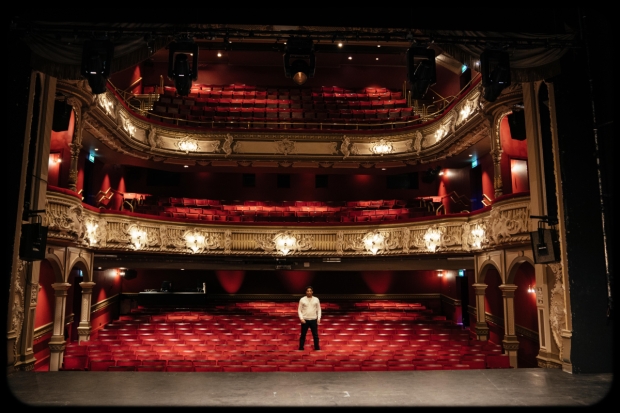
© Helen Murray
Monologues are the currency of lockdown; I feel I have been addressed by more single people in the past eighteen months than ever before in my life. What makes these monologues from The Mono Box and Apatan Productions slightly different is that they are deliberately showcasing the work of emerging writers – and are part of a support network to train and encourage incipient talent that has been in place since 2013.
Written under the guidance of playwright mentors such as Inua Ellams, Duncan Macmillan, Theresa Ikoko, Lucy Prebble and Alice Birch, they deliberately offer seven ethnically diverse young writers a chance to have their voices heard. They are a direct response to questions about what they want to see on the stage as theatre comes back to life, and are presented with the help of established actors in the setting of seven empty London theatres.
The results are without exception beautifully and imaginatively filmed, with direction by Roberta Zuric that brings out the different qualities of each piece. Their variety is impressive from maatin's Sharia's Law, in which the theatre-loving narrator (Shane Zaza) climbs over the Lyric Hammersmith's empty seats as he muses on the way "the harder it becomes to be a Muslim the more Muslim I become" to Charles Entsie's Daniel (filmed at the Bush) in which Ken Nwosu sees his entire life flash before his eyes while he is confined to a toilet cubicle.
Then there's Roberta Livingston's Joy, seemingly set in a mirrored nightclub but in fact filmed at the Young Vic, where the different beats of Mono Box co-founder Joan Iyiola's performance mark the script's swift and surprising changes of mood and narrative, and Vivian Xie's affecting Cynthia in which Isabella Laughland muses on the guilt induced by the death of a friend whom she feels she has failed.
All the monologues effortlessly represent topical concerns but Screams, by Kiran Benawra, has an original, enticing structure, as it uses the rules of modern dating to examine the timeless complexity of love. It was my favourite, partly because the filming, in black and white at the Arcola Theatre, is particularly smart and stylised and performed with graceful insight by Thalissa Teixeira, but also because the monologue itself is both simple and daring.
I was also particularly struck by the courage of Sid Sagar's Rush, blisteringly performed by Danny Kirrane, which takes the format of a police interview and cleverly uses it to reveal both the fragility of a man's mind and the tragedy of racism of the kind that makes a harassed white man react in particular ways.
The evening ends with Dipo Baruwa-Etti's intriguing The Madness, in which a compelling Sharon Duncan-Brewster plays games with the nature of theatre itself and the need to navigate truth and fiction. "I'm an actor – that makes me a skilled liar", she says, looking challengingly at the camera. "I need this," she says, as she bends to kiss the stage of the Almeida. "True or false?"
It's an excellent provocation on which to end an evening that has a freshness and excitement – and is full of promise for the future if these young voices get a further chance to be heard.
Screening repeated 1 to 3 July












